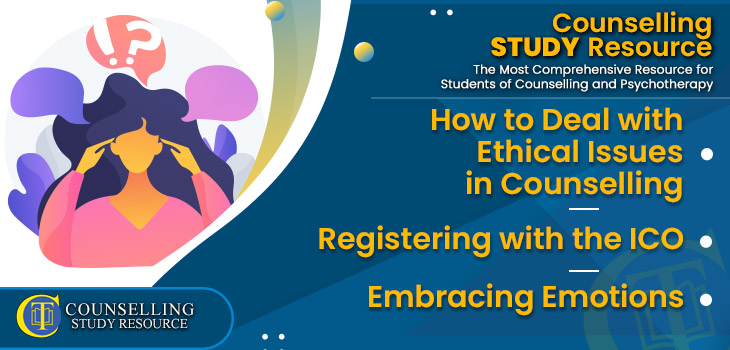278 – How to Deal with Ethical Issues in Counselling
Registering with the ICO – Embracing Emotions
NOTE: The Counselling Tutor Podcast is a free resource, which is available on the main Counselling Tutor website. We also place it in CSR for your ease of access. Unlike our other CSR resources, podcast episodes may include presenters’ opinions, and are not intended to be referenced for academic use.
In Episode 278 of the Counselling Tutor Podcast, your hosts Rory Lees-Oakes and Ken Kelly are back with this week’s three topics:
- Firstly in ‘Student Services’, we look at how to deal with ethical issues in counselling.
- Then in ‘Ethical, Sustainable Practice’, should you register with the ICO?
- And lastly in ‘Practice Matters’, Rory speaks with Deb Barnard on emotions.
How to Deal with Ethical Issues in Counselling [starts at 02:21 mins]
Counselling Foundations is sponsored by
Counselling Skills Academy
Learn counselling techniques by seeing counselling skills used in real sessions by qualified therapists.
Real sessions - real-life presentations - real skills.
During your placement, it’s likely that you’ll face an ethical dilemma. Learning how to respond to these ethical issues under pressure will be an essential skill for improving your counselling practice and ensuring you’re doing what is right for your client and the safety of others:
- Ethical problem solving – set yourself up to be prepared to deal with these problems when they arise.
- Some possible ethical issues in counselling:
- Maybe you and the client have a mutual friend/acquaintance.
- They may disclose self-harm or plans to harm another.
- The client might show up to a session under the influence of alcohol or drugs.
- Look at your contract – if one of these scenarios is covered in your contract, then the rules of engagement have already been laid out.
- Ethical framework – To know how best to deal with ethical issues you might encounter in your counselling practice, understand your ethical framework and what it asks of you.
- Work out whose problem it is. Yours? The client’s? Both of yours?
- What are you going to do next?
- What does the law say?
- Having these conversations with a client can be tricky – but not having them could have greater consequences.
- Immediately write down any ethical issue or dilemma you encounter and what you did or didn’t do.
- Defensible decision-making.
- Respect the clients’ autonomy, but weigh that up against the stakes.
- You may need to break confidentiality, and this will most likely negatively impact the therapeutic relationship.
- Think of the greater good.
A handout on Ethical Problem-Solving is available for download in the green button above.
Registering with the ICO [starts at 25:40 mins]
The Information Commissioners Office (ICO) applies to our UK listeners, but for our listeners elsewhere, you will also have laws regarding data protection that you will need to look at and adhere to.
The main points of this section include:
- The ICO upholds the General Data Protection Regulations.
- Should you register? In short, yes.
- If you have client information stored on an electronic device e.g. notes, phone numbers, doctors notes, a referral letter etc. This is all personal data.
- If you're handling or moving personal data around, then you need to register with the ICO.
- Special category data – any information including ethnic origin, politics, religion, trade unions, health, mental health.
- Put your ICO number in your privacy policy.
- If you request, the ICO won’t publically publish your name and address and will keep it anonymous.
Embracing Emotions [starts at 38:35 mins]
The National Counselling Society is proud to sponsor Practice Matters.
NCS are really excited to have launched their Children and Young People Therapist Register for counsellors working with the younger age group.
In this week’s ‘Practice Matters’, Rory speaks with Deb Barnard about emotions.
The key points of this discussion include:
- Normalising emotional content – it is normal to feel all emotions.
- We are often sold things in the media that are said to make us happy, or content, but it’s important to realise that it’s normal to not always feel like that.
- Embrace your own emotions and understand what they mean to you.
- Learning to lean into emotions, even when they make us uncomfortable.
- What is this emotion asking of you?
- Don’t see your emotions as the enemy.
- Allow yourself to feel and experience your emotions.
- Listen to what your emotions are telling you.
- It isn’t only positive emotions that are valid.


